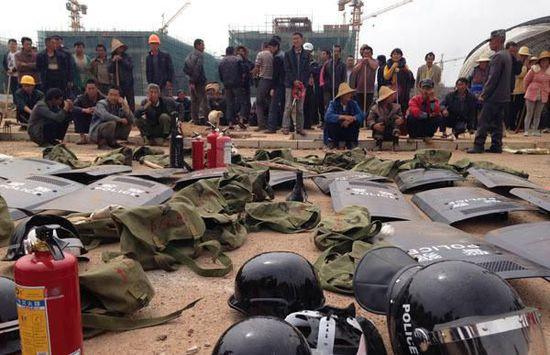Rule of law can help end land disputes
- By Dang Guoying
 0 Comment(s)
0 Comment(s) Print
Print E-mail China Daily, October 23, 2014
E-mail China Daily, October 23, 2014
|
|
|
A conflict over land requisition in Jinning last week left eight people dead and 18 injured. |
The rule of law figures high on the agenda of the ongoing Fourth Plenum of the 18th Central Committee of the Communist Party of China. That the strengthening of the rule of law is of utmost importance was once again proved by a conflict over land requisition in Jinning, Yunnan province, last week. The clash between about 1,000 armed constructors and villagers in Jinning that left eight people dead and 18 injured was one of the hundreds that take place in the country every year.
Local governments, in general, pay reasonable price to requisition land for development. The accepted international pricing mechanism for acquiring agricultural land for commercial use is between 30 and 150 times the annual rent. If a farmer wants anything more than that, property developers could change their mind.
Since the annual rent for 1 mu (666.7 square meters) of agricultural land is about 500 yuan, the fair price should be between 15,000 yuan ($2,451) and 75,000 yuan, whereas local governments often pay 30,000 to 50,000 yuan for 1 mu. But despite this, local governments have a bad reputation. Just Google "land requisition" and you will know how much fury farmers have against local governments and how many bloody conflicts take place every year.
Why? For the answer, we first have to understand China's land ownership system. Theoretically, all land in China is public property, and in rural areas, village authorities are authorized to offer plots to farmers on "contract". That's why when local governments need land for development purposes, they talk with village authorities, not individual farmers. Local officials even refuse to refer to land requisition as "purchase" and use the term "reimbursing farmers" instead.
Farmers define justice differently. They emphasize that when local governments acquire their land for commercial use, they need to negotiate the "deals" according to market rules. Such pleas are almost always rejected because local governments do not accept them as equal negotiators.
As a result, what should ideally be a commercial negotiation between local governments and farmers becomes a political game in which both sides try to get their way. And given the lax rule of law, such political games tend to escalate into mass incidents.







Go to Forum >>0 Comment(s)